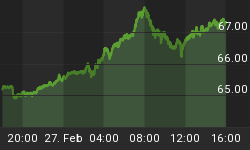New York, and much of the East coast, is picking up after Hurricane Irene. While the hurricane itself delivered less punch than it was expected to, it was enough to cause serious disruption in the pace of everyday life - and in the financial markets. New Jersey Transit was inoperable on Monday, which means that most of the Wall Streeters who live in New Jersey probably took it as a 'snow day.' Connecticut was hit harder by the storm. In the entire commuting region, in fact, there was a lot of cleanup to do.
So, relieved of the adult supervision, the stock market jumped.
I never know how to think about huge moves on very thin volume when many of the main traders are out. These happen at the end of the year sometimes as well. It is of course a bad approach to pay extra for liquidity when it isn't necessary, and bid up a market that will probably still be there tomorrow. Are the bulls (in this case; it isn't always the bulls, though) so impatient to get long that they would lift any price today? The S&P rallied 2.8%, and the NASDAQ - which has more of the smaller stocks that hedge funds like to manipulate into month-end - was up 3.3%. Volume, despite the large gains, was only 870mm shares (and nearly one-third of that came in the final ten minutes).
It may be that bulls are that anxious to get long. Bloomberg today had a headline "U.S. Stocks, 'Massively Undervalued' as Gold Gets Bubbly." The description comes from a report from a little-known firm; apparently, to get on Bloomberg's "TOP" news you just need to be really strident about being bullish. Now, for stocks to be "massively" undervalued, considering they're only 12% below the highs of the last several years, this firm must have believed in May that they were already considerably undervalued, and none of the intervening information - weak economic data, the end of the Fed's QE2, the collapse of Greece, and so on - changed the fundamentals enough to matter. I'm assuming here that "massively" undervalued is at least, say, 30-40%? I suppose that if you think stocks are undervalued by that much, then you might buy aggressively today so as not to miss the rally. Then again, if you think that stocks are undervalued by that much, you're probably already quite long. From, for example, May.
I do confess to my own sense of frustration, although it isn't acute yet. Stocks are too strong to aggressively short, and bonds seem to be as well. Moreover, the fixed-income market is coming into the strongest seasonal period of the year, and as a rule I need a darn good reason to get short bonds in September. I don't have such a reason, although I suspect that 2011 is not going to be typical and we will see rates rise. It's just hard to position for that right now.
One factor supporting stocks and TIPS, in the short run, and serving as a negative for bonds, is the fact that the ECB's stance on inflation (according to President Trichet) is going to be "reassessed" by the ECB. Previously, the ECB was tightening into a financial crisis, which was insane (as I pointed out here among other places). While the inflation risks haven't receded in the slightest, by pointing at headline inflation and saying that they have receded, Mr. Trichet can back off of his prior cuckoo stance and avoid repeating the errors of the 1929-30 Federal Reserve. Earlier this month, the ECB was pumping liquidity into the banking system in the form of LTROs and MROs "as long as needed," which wasn't consistent with the hawkish stance of policy; so, it is necessary to adjust the hawkish stance of policy.
All of the world's major central banks are now providing easy money with inflation on the rise. Let me repeat that: all of the world's central banks are now providing easy money with inflation on the rise. It is therefore not surprising to me that TIPS yields are only 0.19% at the 10-year point (though that's too expensive for me), or that equities are having trouble going down since many investors believe that inflation is good for stocks. But I sure don't understand why 10-year note yields are at 2.27%!
After mulling it over for a while, I think that the rally today is unconvincing. I wouldn't spend a lot of time mulling it over except for the fact that technically the S&P settled above the high from mid-August, and that suggests further upside. If the S&P hadn't finished on a technical break, I'd probably be interested in getting short against that level. But a marginal break on extremely light volume is not where I want to jump on board! I may still be proven wrong and see the indices move to new highs, but I still think the low for the year has not been set.
The data calendar is not going to be kind to stocks or bonds. Tomorrow Consumer Confidence for August (Consensus: 52.0 from 59.5) ought to decline to a 10-month low. Of more interest to me is whether the "Jobs Hard to Get" figure (last at 44.1) rises appreciably. If confidence falls, but Jobs Hard to Get doesn't rise much, then that will blunt the impact of falling confidence. Also tomorrow the minutes of the FOMC meeting will be released at 2:00ET. Since this meeting appears to have been contentious, it will make for interesting reading. Remember that many investors believe QE3 has been effectively promised for late September. I think that the minutes will dent those hopes, and that will tend to steepen the yield curve and drive rates generally higher.
Maybe a tactical bond short isn't such a bad idea after all.















